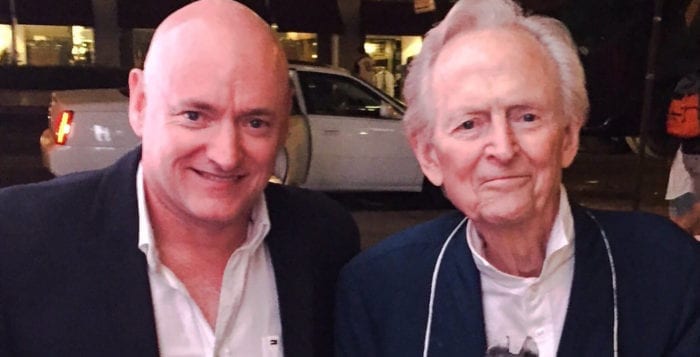By Daniel Dunaief
How often do you get to talk to someone whose legend loomed large over your childhood?
Last year, I had the privilege of interviewing author Tom Wolfe, who died last week at the age of 88. Wolfe wrote “The Right Stuff,” “The Bonfire of the Vanities,” and “The Electric Kool-Aid Acid Test,” among others. I spoke with Wolfe about astronaut Scott Kelly, who was so inspired by “The Right Stuff” that he directed a life he considered somewhat aimless toward becoming a fighter pilot and, eventually, an astronaut.
My conversation was rewarding and memorable, so I thought I’d share my interview with the legendary author.
DD: Kelly credits you with putting him on a path that led him to spend almost a year aboard the International Space Station. Is there a satisfaction that comes from that?
TW: Nothing else I’ve written has had such a beautiful result. He told me he’d been floundering around trying to figure out what to do with his life. He hadn’t been doing well in school. Then he just got the idea of going into space and became an astronaut.
DD: Did you know he took “The Right Stuff” with him?
TW: He sent me from the space station a picture of the cover on his iPad. That was one of the greatest messages I ever got.
DD: Do you think Kelly’s mission increased the excitement about space?
TW: There’s been a general lack of a sense of heroism in much of the post-World War II era and there were people who responded to the space program in general in that fashion.
DD: How does the excitement now compare to the early days of the space program?
TW: John Glenn’s return created a lot of excitement. At that time, we seemed to be at war in space with the Russians. That was what kept the space program going. There was always this threat. It’s very hard to hit the Earth from space. You’ve got three speeds: the speed of what you fired the rocket with, then you’ve got the speed at the end of that opening shot and you’ve got the speed of hitting the Earth, which is moving.
DD: How do you think people will react to Kelly’s mission?
TW: It remains to be seen whether it inspires young people the way the Mercury program did.
DD: What drove the space program until that point?
TW: Wernher van Braun [a German engineer who played a seminal role in advancing American rocket science] spoke in his last year. The point of the space program was not to beat the Russians. It was to prepare for the day when the sun burns out and we have to leave Earth and go somewhere else. It’s hard to imagine everybody shipping off to another heavenly body.
DD: Getting back to Kelly, how difficult do you think Kelly’s mission was?
TW: Scott Kelly’s adventures were a test of the human body and the psyche. Being that removed from anybody you could talk to and see must be a terrible stress. That’s what he and others in the space station are chosen for.
DD: Do people like Kelly still need “the right stuff” to be astronauts?
TW: It’s the same except anyone coming into the program is more confident that these things can be done. For Mercury astronauts, these things were totally new. The odds against you, the odds of death, were very high.
DD: What advice did you give to Kelly when he started writing his book?
TW: Begin at the beginning. So many of the astronauts and other people who have memorable experiences will start with the adventure to get you interested. Then, the second chapter, suddenly you’re saying, “Harold Bumberry was born in 1973,” and it makes you take a deep breath [and say], ‘OK, here it comes.” Whereas starting at the beginning always works.
DD: What do you think of the movies made about your books?
TW: I think they’re terrible. Three of my books were made into movies and I disliked them all. The reason being they didn’t do it like I did. You can’t do a lot of things in a movie that you can in print. You’re better at presenting themes, better at dialogue. You can hear it, you can’t get inside a mind of a character the way you can in print. Movies don’t have time.
DD: What impact did Scott Kelly’s being inspired by your book have on you?
TW: It’s the best compliment I’ve ever gotten.





